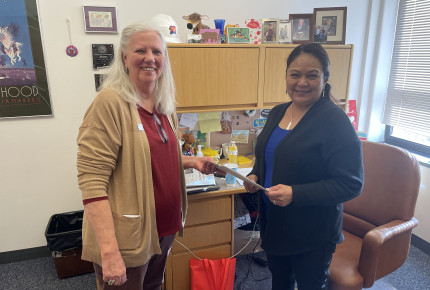New Mexico Press Releases
SANTA FE, NEW MEX. – February 22, 2024 – State Representative Joy Garratt was honored with the ‘Legislative Champion Award’ by the American Cancer Society Cancer Action Network (ACS CAN) during a luncheon, Thursday. This award is the highest honor given by the organization. Garratt was recognized for her leading role in expanding access to biomarker testing in New Mexico. She served as a lead sponsor for HB 73 during the 2023 legislative session.
More than a dozen cancer survivors, patients, and caregivers convened at the Santa Fe Roundhouse for ‘New Mexico Cancer Action Day’ on Tuesday afternoon. During the event, hosted by The American Cancer Society Cancer Action Network (ACS CAN), cancer advocates met with state lawmakers and urged them to support policies that impact the fight against cancer.
Attorneys General for six states and DC today announced a $462 million multi-state settlement to be paid out by JUUL Labs, following an investigation into its underage marketing practices to attract youth to its addictive e-cigarettes.
New Mexico Governor Michelle Lujan Grisham signed House Bill 73 Wednesday, expanding access to biomarker testing to more patients statewide. The American Cancer Society Cancer Action Network (ACS CAN) and its team of volunteers, including cancer survivors, patients, caregivers and partners applaud the Governor and State Legislators for taking this extraordinary step in prioritizing the needs of patients in New Mexico and revolutionizing their access to care.
The American Cancer Society Cancer Action Network (ACS CAN) applauds members of the New Mexico State Legislature for passing House Bill 73 as the 2023 legislative session wrapped up. With the signature of Governor Michelle Lujan Grisham, the bill will expand access to biomarker testing statewide, helping to revolutionize cancer care in New Mexico.
ALBUQUERQUE – As Governor Michelle Lujan-Grisham is planning to call a special session to pass the Cannabis Regulation Act, a coalition of leading public health groups across New Mexico joined together to urge lawmakers to protect the state’s smokefree air laws, cautioning again
ALBUQUERQUE, NM - Today, state legislators heard from cancer patients, survivors, and public health advocates during New Mexico’s virtual Tobacco Action Day.
An amendment filed Tuesday to House Bill 6 will severely undercut efforts to combat Big Tobacco in New Mexico, where more than 28 percent of all cancer deaths can be attributed to its products.
The American Cancer Society Cancer Action Network (ACS CAN) will be presenting testimony this week at three legislative hearings in Santa Fe that could help forge a new direction in the state’s battle to address the growing crisis caused by tobacco products.
